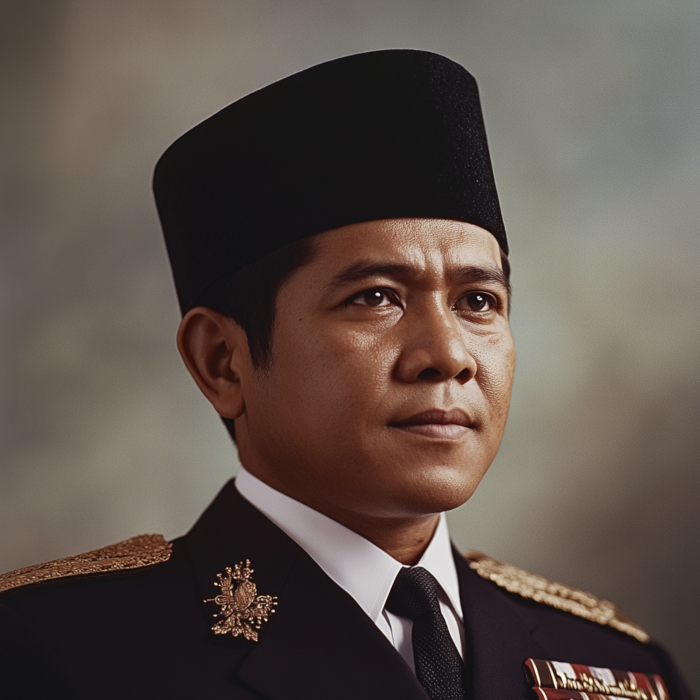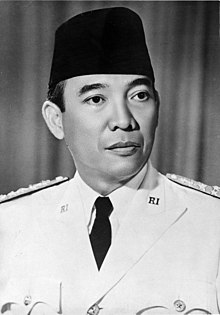


Sukarno (1901–1970) was the first President of Indonesia, serving from 1945 to 1967, and the leading figure in the country's struggle for independence from Dutch colonial rule. A charismatic orator and visionary leader, Sukarno was one of the founding fathers of modern Indonesia. He played a pivotal role in uniting the diverse archipelago into a single nation and is remembered for his efforts to forge a strong, independent Indonesia. However, his presidency later became marked by authoritarianism, economic turmoil, and political instability, which led to his eventual ousting in 1967 by General Suharto.
Birth and Family Background: Sukarno was born as Kusno Sosrodihardjo on June 6, 1901, in Surabaya, East Java, in what was then the Dutch East Indies (now Indonesia). His father, Raden Soekemi Sosrodihardjo, was a Javanese schoolteacher, and his mother, Ida Ayu Nyoman Rai, was of Balinese royal descent. As a child, he was given the name "Kusno" but later changed his name to "Sukarno" after recovering from a childhood illness.
Education and Political Awakening: Sukarno was highly intelligent and attended Dutch-language schools, which were rare for native Indonesians at the time. He went on to study civil engineering at the Bandung Institute of Technology, where he became politically active. Influenced by anti-colonial ideas and global movements for independence, Sukarno joined nationalist circles and became a strong advocate for Indonesia's independence from Dutch colonial rule.
Sukarno’s exposure to European ideologies such as Marxism, socialism, and nationalism played a significant role in shaping his political thought. He was particularly inspired by the idea of pan-Islamism and the struggles for independence in other colonized nations.
Founding of the Indonesian National Party (PNI): In 1927, Sukarno co-founded the Indonesian National Party (PNI), a political organization dedicated to achieving independence from the Dutch. The PNI called for national unity, non-cooperation with the colonial government, and social justice. Sukarno’s leadership and powerful oratory made him a prominent figure in the independence movement, and he quickly became a symbol of resistance against Dutch colonial rule.
Arrest and Imprisonment: Due to his political activism, Sukarno was arrested by Dutch colonial authorities in 1929 and sentenced to prison for subversion. During his imprisonment, he continued to inspire the nationalist movement, writing extensively on the need for unity and independence. Sukarno was released in 1931 but remained under constant surveillance by the Dutch, who saw him as a major threat to colonial rule.
Exile and Continued Activism: Throughout the 1930s, Sukarno was exiled by the Dutch to remote areas of Indonesia in an attempt to limit his influence on the growing nationalist movement. However, even in exile, Sukarno maintained his political activities, communicating with other leaders and writing about Indonesia’s future.
Japanese Occupation (1942–1945): When Japan invaded and occupied Indonesia during World War II, Sukarno saw an opportunity to advance the cause of Indonesian independence. Although he initially cooperated with the Japanese occupiers, seeing them as potential liberators from Dutch rule, Sukarno soon realized that Japan had its own imperial ambitions in Southeast Asia.
The Japanese occupation was harsh, but it provided Sukarno and other nationalists with a platform to organize and mobilize the Indonesian population. Sukarno used his leadership skills to rally support for the independence movement, and he worked closely with other nationalist leaders, including Mohammad Hatta and Sutan Sjahrir.
Proclamation of Independence (1945): As Japan's defeat in World War II became imminent, Sukarno and Hatta seized the moment to declare Indonesia’s independence. On August 17, 1945, Sukarno read the Proclamation of Indonesian Independence, marking the birth of the Republic of Indonesia. Sukarno became Indonesia’s first president, with Hatta as vice president.
Guided Democracy: After Indonesia’s independence, Sukarno sought to unify the country, which was composed of thousands of islands and hundreds of ethnic and linguistic groups. He believed that Indonesia needed a strong central government to prevent fragmentation and instability. To this end, he developed the concept of "Guided Democracy," which sought to balance the competing interests of the military, political parties, and ethnic groups under his leadership. Sukarno was heavily influenced by the Javanese tradition of a centralized, paternalistic ruler and believed in a strong presidential system.
In 1959, Sukarno dissolved the parliamentary system and established Guided Democracy, under which he held sweeping executive powers. While Sukarno’s system aimed to prevent political infighting and create stability, it effectively turned Indonesia into an authoritarian state. He ruled by decree, sidelined political opposition, and relied increasingly on the military to maintain control.
Non-Aligned Movement and International Role: Sukarno was a leading figure in the Non-Aligned Movement, which sought to position newly independent nations outside the Cold War rivalry between the United States and the Soviet Union. Along with leaders like Gamal Abdel Nasser of Egypt, Jawaharlal Nehru of India, and Josip Broz Tito of Yugoslavia, Sukarno advocated for a "third way" in international politics, one that did not align with either the Western or Eastern blocs.
In 1955, Sukarno hosted the Bandung Conference, a gathering of Asian and African nations in Bandung, Indonesia, to promote solidarity, anti-colonialism, and neutrality in the Cold War. The conference was a landmark event in the history of the Non-Aligned Movement and helped establish Sukarno as a prominent leader on the global stage.
Economic Mismanagement: Despite his success on the international stage, Sukarno’s domestic policies led to significant economic decline. His focus on political ideology and nation-building came at the expense of economic stability. By the early 1960s, Indonesia was facing rampant inflation, widespread poverty, and economic mismanagement. The government’s attempts at nationalizing foreign-owned companies and implementing socialist-inspired policies were largely unsuccessful, further exacerbating economic difficulties.
"Nasakom" Ideology: Sukarno attempted to unify Indonesia’s diverse political factions through the concept of Nasakom, which stood for Nationalism, Religion, and Communism. He believed that by combining these three elements, he could create a uniquely Indonesian form of governance that would balance the interests of the country's nationalist, Islamic, and communist groups.
However, Nasakom deepened political divisions in Indonesia, particularly between the Indonesian Communist Party (PKI), which Sukarno supported, and the military, which viewed communism as a threat. Sukarno’s close relationship with the PKI alarmed many within the military and the broader political establishment, contributing to growing tensions.
The 1965 Coup Attempt: On September 30, 1965, a group of military officers attempted a coup, killing several high-ranking generals. The exact motivations behind the coup remain contested, but it was quickly suppressed by General Suharto, the head of the Indonesian Army's Strategic Reserve Command. Suharto accused the PKI of orchestrating the coup, and in the aftermath, the military launched a massive anti-communist purge that resulted in the deaths of an estimated 500,000 to 1 million people.
The purge, one of the largest mass killings of the 20th century, effectively destroyed the PKI and shifted the balance of power away from Sukarno.
Sukarno’s Decline: In the wake of the 1965 coup attempt, Sukarno’s power rapidly declined as Suharto and the military assumed greater control. Sukarno’s refusal to condemn the PKI and his continued support for Nasakom alienated much of the political establishment. By 1966, Suharto had effectively sidelined Sukarno, taking control of the government and instituting the New Order regime.
Ousting and House Arrest: In 1967, Sukarno was formally stripped of the presidency by the Indonesian parliament, and Suharto was installed as acting president. Sukarno spent the remainder of his life under house arrest in Jakarta. His health deteriorated in his final years, and he died on June 21, 1970. Despite his fall from power, Sukarno remained a beloved figure among many Indonesians, who admired his role in securing independence.
Father of Indonesian Independence: Sukarno is remembered as the "Father of Indonesian Independence" and remains a revered figure in Indonesian history for his role in leading the fight against Dutch colonial rule. His vision of a unified, independent Indonesia inspired generations of nationalists and remains a central part of the country’s national identity.
Charismatic Leader and Orator: Sukarno’s charisma and oratorical skills made him a highly influential leader, both in Indonesia and internationally. He was able to mobilize the masses with his speeches, calling for unity, independence, and anti-colonialism. His influence in the Non-Aligned Movement also made him a prominent figure in the global struggle against imperialism.
Controversial Legacy: Despite his contributions to Indonesia’s independence, Sukarno’s presidency remains controversial. His economic mismanagement, growing authoritarianism, and close ties with the Indonesian Communist Party contributed to the political chaos of the mid-1960s, which culminated in the bloody anti-communist purges and his eventual ouster. His legacy is thus a complex one, blending heroic leadership with a troubled and tumultuous end to his presidency.
Sukarno’s Family and Political Dynasty: Sukarno’s family continued to play a prominent role in Indonesian politics after his death. His daughter, Megawati Sukarnoputri, became Indonesia’s first female president, serving from 2001 to 2004. Megawati’s political career further cemented the Sukarno family’s influence in Indonesia’s post-Suharto era.
Sukarno was a towering figure in Indonesia’s history, known for his role as a revolutionary leader and the architect of Indonesia’s independence. His presidency, marked by both visionary ideals and significant challenges, shaped the trajectory of modern Indonesia. Sukarno’s legacy as a founding father of the nation is tempered by the economic mismanagement and political turmoil that characterized his later years in power. Nevertheless, Sukarno remains a symbol of Indonesia’s fight for freedom, unity, and self-determination.

We use cookies
We use cookies and other tracking technologies to improve your browsing experience on our website, to show you personalized content and targeted ads, to analyze our website traffic, and to understand where our visitors are coming from. Privacy Policy.